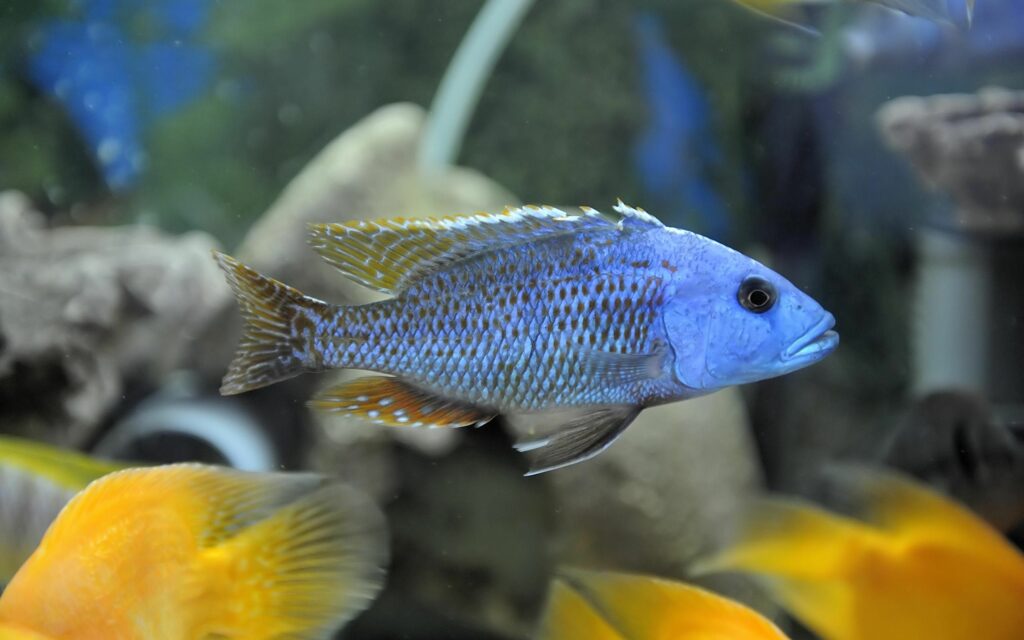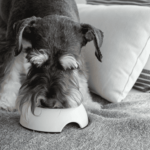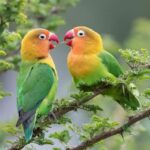Table of Contents
African Cichlids are known for their vibrant colors and dynamic behavior. Proper nutrition is key to maintaining their health and enhancing their natural beauty. This guide provides valuable insights into the feeding habits of the African Cichlid, helping you provide the best diet for these fascinating fish.

1. Understanding Their Natural Diet
In the wild, African Cichlids have diverse diets based on their species and habitat:
- Herbivores: Some species primarily consume algae and plant matter.
- Omnivores: These Cichlids eat both plant material and small invertebrates.
- Carnivores: Certain species are mainly carnivorous, feeding on insects, larvae, and smaller fish.
2. Providing a Balanced Diet
A balanced diet is essential for the health and vitality of African Cichlids:
- Commercial Food: High-quality flakes or pellets designed for African Cichlids should form the staple of their diet.
- Fresh Vegetables: Supplement with blanched vegetables such as spinach, peas, and lettuce for herbivores and omnivores.
- Protein Sources: Include occasional feedings of live or frozen foods like brine shrimp, bloodworms, and daphnia for omnivores and carnivores.
3. Feeding Frequency
Establishing a regular feeding schedule is crucial:
- Twice Daily: Feed adult Cichlids twice a day, providing only what they can consume in a few minutes.
- Smaller Portions: Offer smaller, more frequent meals to juvenile Cichlids to support their rapid growth.
- Avoid Overfeeding: Overfeeding can lead to water quality issues and health problems, so avoid giving too much food.
4. Observing Feeding Behavior
Monitoring your Cichlids’ feeding behavior helps ensure they are eating properly:
- Active Feeding: Healthy Cichlids are usually active and eager during feeding times.
- Aggression: Cichlids can be territorial and aggressive during feeding, so watch for signs of bullying.
- Uneaten Food: Remove any uneaten food after a few minutes to maintain water quality.
5. Avoiding Common Dietary Issues
Be aware of common dietary issues that can affect African Cichlids:
- Bloating: Overfeeding or feeding inappropriate foods can cause bloating. Avoid foods high in fillers and low in nutrients.
- Malnutrition: Ensure a varied diet to prevent nutritional deficiencies and promote overall health.
- Poor Water Quality: Excess food can decay and impact water quality, leading to stress and disease.
6. Seasonal and Life Stage Adjustments
Adjust their diet based on seasonal changes and life stages:
- Breeding Season: Provide extra protein-rich foods during breeding to support reproductive health.
- Juveniles: Young Cichlids require more frequent feedings with a focus on protein to support growth.
- Maintenance Diet: Adult Cichlids not in breeding season require a balanced maintenance diet.
7. Supplements and Treats
Occasional supplements and treats can enhance your Cichlids’ diet:
- Vitamins: Add liquid vitamins to their food or water to boost their immune system.
- Algae Wafers: Offer algae wafers for herbivorous species to graze on.
- Treats: Use treats like krill or mysis shrimp sparingly to avoid dietary imbalances.
Conclusion on Feeding Habits of the African Cichlid
Understanding the feeding habits of the African Cichlid is crucial for maintaining their health, vibrancy, and overall well-being. By providing a balanced diet, monitoring feeding behavior, avoiding common dietary issues, and adjusting their diet according to their life stage, you can ensure your Cichlids thrive. For more information on African Cichlid care, visit the ASPCA and Cichlid-Forum.
FAQs on Feeding Habits of the African Cichlid
How often should I feed my African Cichlids?
Adult African Cichlids should be fed twice a day, while juveniles may require smaller, more frequent meals to support their growth.
What should I include in my Cichlids’ diet?
Provide a balanced diet with high-quality commercial food, fresh vegetables, and occasional live or frozen protein sources. Adjust the diet based on whether they are herbivores, omnivores, or carnivores.
How can I prevent overfeeding my Cichlids?
Feed only what they can consume in a few minutes and remove any uneaten food promptly. Monitor their feeding behavior to avoid giving them too much food.
Are there any common dietary issues in African Cichlids?
Yes, common issues include bloating from overfeeding, malnutrition from an unbalanced diet, and poor water quality due to excess food. Provide a varied and appropriate diet to prevent these problems.
Do African Cichlids require dietary adjustments during breeding?
Yes, during breeding, offer extra protein-rich foods to support reproductive health. Juveniles also need more frequent feedings with a focus on protein for growth.
Can I give my Cichlids treats?
Yes, occasional treats like krill or mysis shrimp can be given sparingly. Ensure that treats do not cause dietary imbalances and are appropriate for their dietary needs.











